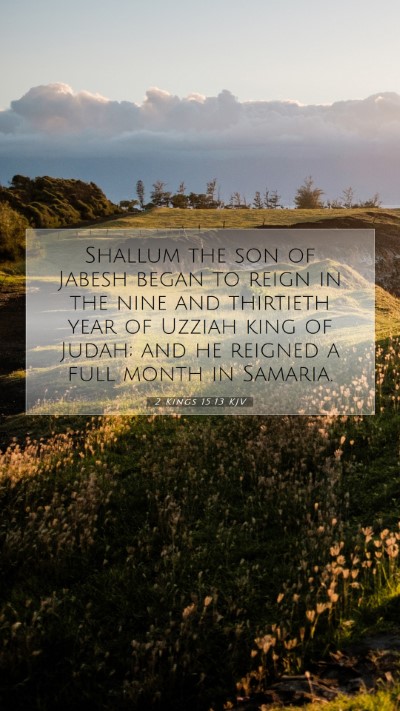Bible Verse Explanation: 2 Kings 15:13
The verse 2 Kings 15:13 reads:
"Shallum the son of Jabesh began to reign in the thirty-ninth year of Uzziah king of Judah; and he reigned a full month in Samaria."
This passage presents a significant moment in the history of Israel, illustrating the tumultuous nature of leadership during this period. The text presents a concise narrative about Shallum's brief reign, marking a period of instability and transitions in Israel's monarchy.
Contextual Significance
Historically, Shallum's reign is emblematic of a time when Israel was experiencing political instability and vulnerability. Shallum's ascent to the throne came shortly after the reign of King Zechariah, who himself was assassinated. Such events in the royal lineage signal deeper troubles within the nation, particularly regarding adherence to God’s commandments.
Commentary Insights
-
Matthew Henry's Commentary: Henry emphasizes the brevity of Shallum’s reign, considering it a reflection of God’s judgment upon Israel. His immediate rise to power signifies a tragic continuation of violence and ambition without divine approval.
-
Albert Barnes' Notes: Barnes highlights that Shallum's short tenure (just a month) illustrates the chaos in the northern kingdom of Israel. He draws attention to how God’s providence allows for such turbulence as a warning and a wake-up call to the people.
-
Adam Clarke's Commentary: Clarke notes that the historical context is crucial to understanding this verse. He connects Shallum's actions with the greater theme of cyclical sin and judgment seen throughout Israel's history, suggesting that the Lord was allowing the consequence of sin to manifest in their governance.
Spiritual Lessons and Applications
The significance of 2 Kings 15:13 transcends its historical account, offering several key insights for modern readers:
-
Short-lived Authority: Shallum’s brief rule serves as a reminder that worldly power is transient. It warns believers about the consequences of pursuing power without seeking divine guidance.
-
Importance of Righteous Leadership: The passage stresses the need for leaders who are committed to God's ways. In today's context, this speaks to the importance of integrity in leadership roles, both in the church and in society.
-
God's Sovereignty in Human Affairs: Readers are encouraged to reflect on how God's hand is at work even in periods of chaos. This verse reassures believers of God's ultimate control, despite appearances.
-
Cycle of Sin and Repentance: It highlights the consequences that arise from turning away from God, further urging the faithful to maintain a lifestyle of repentance and adherence to God’s commandments.
Bible Study Resources
For those seeking to deepen their Bible verse understanding, various resources can be invaluable:
- Bible study guides focusing on the historical context of Israel's kings.
- Online Bible study platforms that offer interactive discussions about scripture.
- Commentary collections for in-depth theological insights.
Cross References
2 Kings 15:13 is related to several important passages in Scripture that provide further context and insight:
- 2 Kings 15:8-12: Discusses the preceding king Zechariah.
- 2 Kings 14:29: References the death of King Jeroboam II, affecting the leadership landscape.
- 2 Kings 15:14-16: Outlines the events that lead to Shallum's downfall and the ensuing violence in Israel.
Conclusion
In summary, 2 Kings 15:13 serves as a mirror to the complexities of leadership and morality in governance. Through this verse, readers are invited to explore deeper questions about righteousness, accountability, and the enduring relevance of biblical narratives in guiding contemporary life. Engaging with this text—whether in personal study or group discussions—offers profound insights into the nature of human authority and divine oversight.


